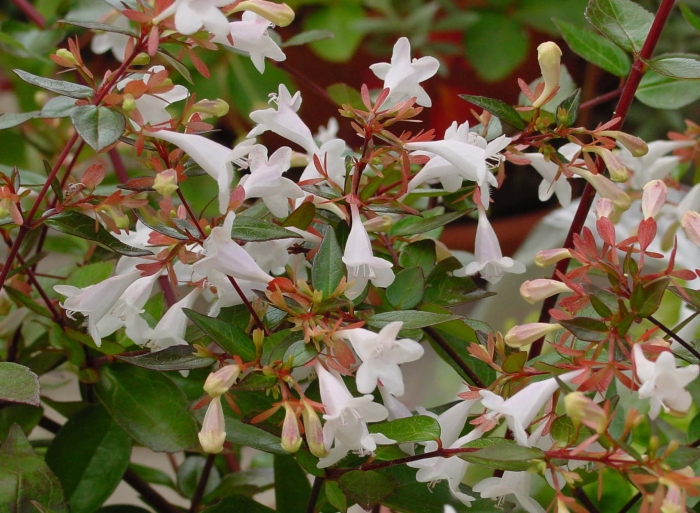Glossy Abelia
(Abelia ×grandiflora)
Glossy Abelia (Abelia ×grandiflora)
/
/

Wouter Hagens
Public domain
Image By:
Wouter Hagens
Recorded By:
Copyright:
Public domain
Copyright Notice:
Photo by: Wouter Hagens | License Type: Public domain | License URL: https://creativecommons.org/public-domain/ | Uploader: Wouterhagens | Publisher: Wikimedia Commons | Title: Abelia_grandiflora_A.jpg | Notes: {{Information |Description=Abelia x grandiflora 'Conti' |Source=own work |Date=2007-09-07 |Author=[[User:Wouterhagens|Wouter Hagens]] |Permission={{PD-self}} }} |





































Estimated Native Range
Summary
Abelia ×grandiflora, commonly known as Glossy Abelia, is a semi-evergreen to deciduous multi-stemmed shrub with a rounded, spreading, or gracefully arching habit, reaching 1 to 1.8 meters (3.3 to 5.9 feet) in height. This garden hybrid, created by crossing Linnaea chinensis with Linnaea uniflora, is part of the honeysuckle family. Glossy Abelia thrives in habitats like open woodlands and forest edges in the regions of its parent species in China. It features clusters of fragrant, bell-shaped flowers that are white tinged with pink and measure up to 2 cm long. The species is notable for its extended blooming period from late summer to autumn, providing color when many other plants have finished flowering.
Glossy Abelia is valued for its long flowering season, attractive glossy foliage, and relatively low maintenance requirements. It is commonly used as an ornamental specimen in gardens, mixed borders, and urban landscapes. While it prefers moist, organically rich soils with good drainage, it is adaptable to a range of soil conditions as long as they are well-drained. It thrives in full sun to part shade and requires medium amounts of water. Although generally easy to cultivate, it is not fully hardy and may need protection in colder climates. Propagation is typically done by cuttings. Potential problems include susceptibility to pests like aphids and scale insects, and it may suffer from leaf scorch in hot, dry conditions.CC BY-SA 4.0
Glossy Abelia is valued for its long flowering season, attractive glossy foliage, and relatively low maintenance requirements. It is commonly used as an ornamental specimen in gardens, mixed borders, and urban landscapes. While it prefers moist, organically rich soils with good drainage, it is adaptable to a range of soil conditions as long as they are well-drained. It thrives in full sun to part shade and requires medium amounts of water. Although generally easy to cultivate, it is not fully hardy and may need protection in colder climates. Propagation is typically done by cuttings. Potential problems include susceptibility to pests like aphids and scale insects, and it may suffer from leaf scorch in hot, dry conditions.CC BY-SA 4.0
Plant Description
- Plant Type: Shrub
- Height: 3-8 feet
- Width: 3-6 feet
- Growth Rate: Rapid, Moderate
- Flower Color: Pink, White
- Flowering Season: Spring, Summer, Fall
- Leaf Retention: Semi-deciduous
Growth Requirements
- Sun: Full Sun, Part Shade
- Water: Medium
- Drainage: Fast, Medium
Common Uses
Bank Stabilization, Bee Garden, Bird Garden, Border Plant, Butterfly Garden, Deer Resistant, Drought Tolerant, Erosion Control, Fire Resistant, Fragrant, Hedges, Hummingbird Garden, Low Maintenance, Potted Plant, Rabbit Resistant, Rock Garden, Salt Tolerant, Street Planting
Natural Habitat
Open woodlands and forest edges in China
Other Names
Common Names: Großblütige Abelie, Da Hua Nuo Mi Tiao
Scientific Names: , Abelia ×grandiflora, Linnaea ×grandiflora, Abelia ×rupestris, Abelia rupestris f. grandiflora, Abelia rupestris var. grandiflora,
GBIF Accepted Name: Abelia ×grandiflora (Rovelli ex André) Rehder